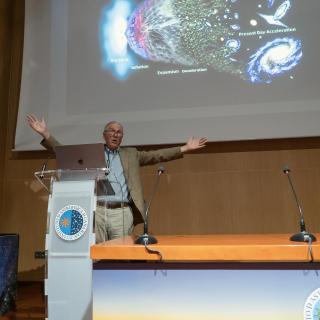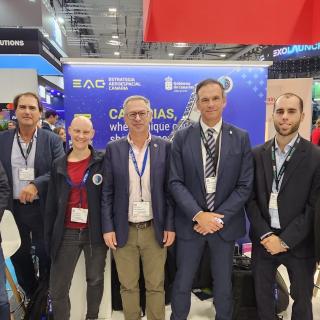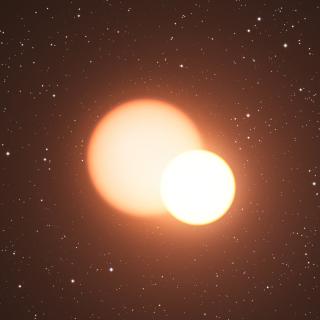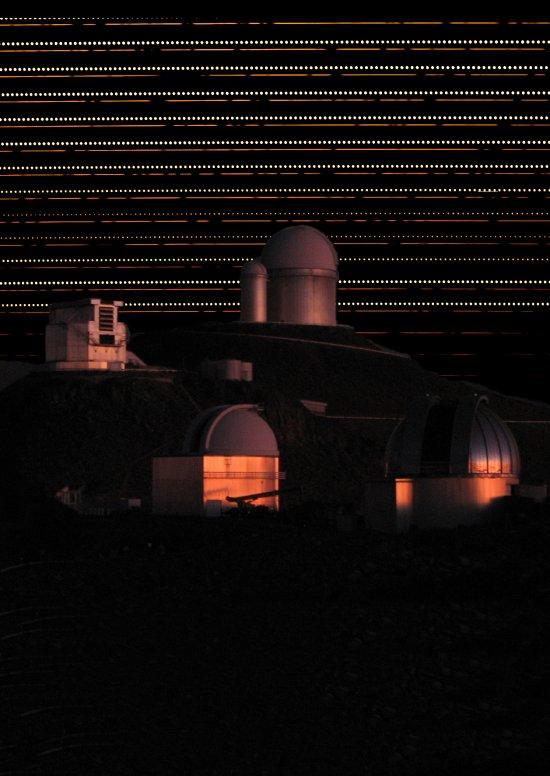It may interest you
-
 The Instituto de Astrofísica de Canarias (IAC) has received a visit from Robert P. Kirshner, Executive Director of the Thirty Meter Telescope International Observatory (TIO) . During his stay at the IAC headquarters in La Laguna, he was welcomed by the center’s director, Valentín Martínez Pillet, and by the deputy director, Eva Villaver Sobrino, along with other members of the research institute. During his visit, he was able to learn firsthand about the institution’s scientific and technological capabilities and gave a colloquium titled The Thirty Meter Telescope and Science of the FutureAdvertised on
The Instituto de Astrofísica de Canarias (IAC) has received a visit from Robert P. Kirshner, Executive Director of the Thirty Meter Telescope International Observatory (TIO) . During his stay at the IAC headquarters in La Laguna, he was welcomed by the center’s director, Valentín Martínez Pillet, and by the deputy director, Eva Villaver Sobrino, along with other members of the research institute. During his visit, he was able to learn firsthand about the institution’s scientific and technological capabilities and gave a colloquium titled The Thirty Meter Telescope and Science of the FutureAdvertised on -
 The Instituto de Astrofísica de Canarias (IAC), through IACTEC-Space, is participating this week in Space Tech Expo Europe, the largest space industry trade fair on the continent, held in Bremen from November 18 to 20. The team is located in the Spain Space pavilion, alongside the Canary Islands Aerospace Strategy (EAC), to showcase the technological developments of the CELESTE laboratories and strengthen international collaborations in the space sector. The I nstituto de Astrofísica de Canarias (IAC) is participating once again in Space Tech Expo Europe, the leading event for the spaceAdvertised on
The Instituto de Astrofísica de Canarias (IAC), through IACTEC-Space, is participating this week in Space Tech Expo Europe, the largest space industry trade fair on the continent, held in Bremen from November 18 to 20. The team is located in the Spain Space pavilion, alongside the Canary Islands Aerospace Strategy (EAC), to showcase the technological developments of the CELESTE laboratories and strengthen international collaborations in the space sector. The I nstituto de Astrofísica de Canarias (IAC) is participating once again in Space Tech Expo Europe, the leading event for the spaceAdvertised on -
 An international team of astronomers, including researchers from the IAC, have performed a unique cosmic test - measuring the mass of an ancient star using two entirely different methods, finding agreement to within just 1.4%. This result marks a milestone in our ability to determine the ages of old stars and use them as living fossils to study the Milky Way’s distant past. The team analysed the red giant in the binary system KIC 10001167 using two independent approaches: firstly, by measuring the brightness and radial velocity variations due to the orbital motion of the binary, and secondlyAdvertised on
An international team of astronomers, including researchers from the IAC, have performed a unique cosmic test - measuring the mass of an ancient star using two entirely different methods, finding agreement to within just 1.4%. This result marks a milestone in our ability to determine the ages of old stars and use them as living fossils to study the Milky Way’s distant past. The team analysed the red giant in the binary system KIC 10001167 using two independent approaches: firstly, by measuring the brightness and radial velocity variations due to the orbital motion of the binary, and secondlyAdvertised on
